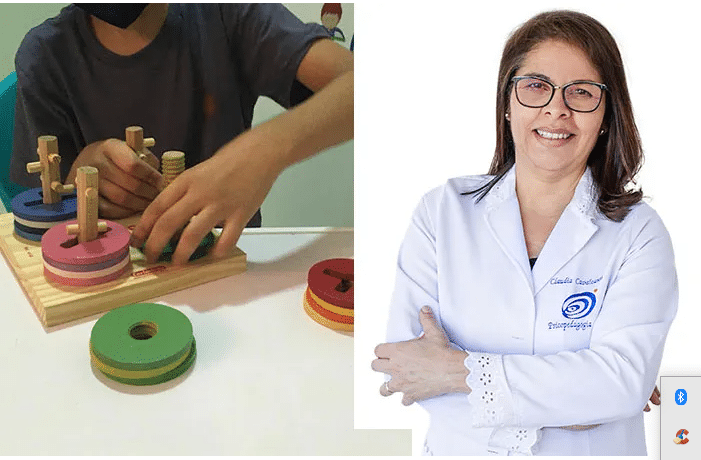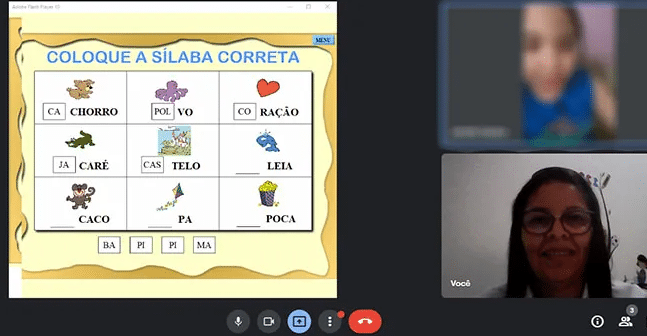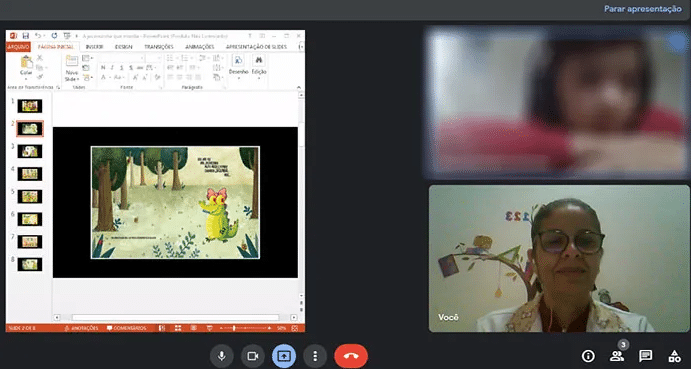The colorful toys are more than simple details that decorate and brighten up Maria Claudia’s work table: they are essential tools for the task she performs. Maria Claudia Cavalcanti Vasconcelos is a psychopedagogist working in Lajedo, Pernambuco, Brazil. She is a leader in the Schoenstatt Family League and sealed her Covenant of Love with the Mother and Queen eight years ago.
Besides the apostolate with the families of the Movement, Maria has a special mission with other families. In her professional work she accompanies children and adolescents with autism, looking for ways to help them overcome difficulties in learning and living with others. Maria Claudia also receives parents who are often troubled and reveal to her their uncertainties and needs regarding their children’s education.

We have interviewed Maria Claudia who answers our questions from her experience in the Covenant of Love which is the foundation of her life and work:
Your area of professional expertise is “School inclusion in neurodevelopmental disorders of autism and its comorbidities”. Why did you choose this specialty?
I have always been interested in understanding how learning develops, especially when this learning is not achieved, in order to be able to intervene assertively and thus help children and adolescents overcome their difficulties and have a satisfactory progress which allows their academic success.
Schoenstatt has the mission of renewing the world. In this sense, how does your work contribute to this renewal in the family, school, and social environments?
First of all, I find the work and charism of the Schoenstatt Movement most admirable. The more we get to know it, the more we love its mission and that, in fact, it has the power to transform lives. The psychopedagogical work focuses on human learning, which encompasses normal and pathological developmental patterns as well as the influence of the environment, that is, family, school, and society. Thus, through the evaluation of the child or adolescent who presents a delay in his/her learning, we can identify the hypothesis and then an intervention plan is elaborated. To achieve this, the active participation of the family and the school is necessary, since the role of the educational psychologist is to mediate this interaction in order to promote the child’s development so that, in the future, he/she will be able to integrate into society.

During the pandemic, what initiatives did you propose to continue your mission despite the many limitations of virtual contact or physical proximity?
At that time, I think we all had to reinvent ourselves. What seemed far-fetched before was suddenly what we were living daily: online interactions.
At first there was a sense of uncertainty, thinking that the children would not respond, as most of them are autistic. But the difficulties were overcome and, with the parents’ commitment, very positive and gratifying results were obtained for everyone.
In your opinion, does the formation you receive from Schoenstatt provide you with something different to achieve your goals?
Yes, in Schoenstatt we learn to respect the human being, appreciating the values and weaknesses of others, trying not to make judgments, just as our Mother and Queen welcomes everyone. In my work as a psychopedagogist I deal directly with the lives of parents who arrive with conflicts and uncertainties. Many even feel like failures as parents because they say they don’t know what to do with their child and are looking for guidance. It is at this moment that I need the wisdom to guide them in some way, and for this, in addition to theoretical and scientific knowledge, I must be able to look at them with those welcoming eyes.

From your professional experience, how could society become more committed to these children and adolescents?
We understand that the family is the environment where the child has its first social contact. When there is a child with special needs, the family must first accept and seek the necessary interventions. The school later becomes the environment that will provide a broader social setting in which, according to the Inclusion Law, everyone, regardless of their condition, has the right to education.
The inclusive school must be based on ethics and sustained by attitudes of responsibility and promoting emotional bond with others, respecting the differences in each human being. On the social level, it is necessary to have a greater commitment from the people involved to demand that the government create public policies which can provide a better quality of life for these children and young people who need better care.
